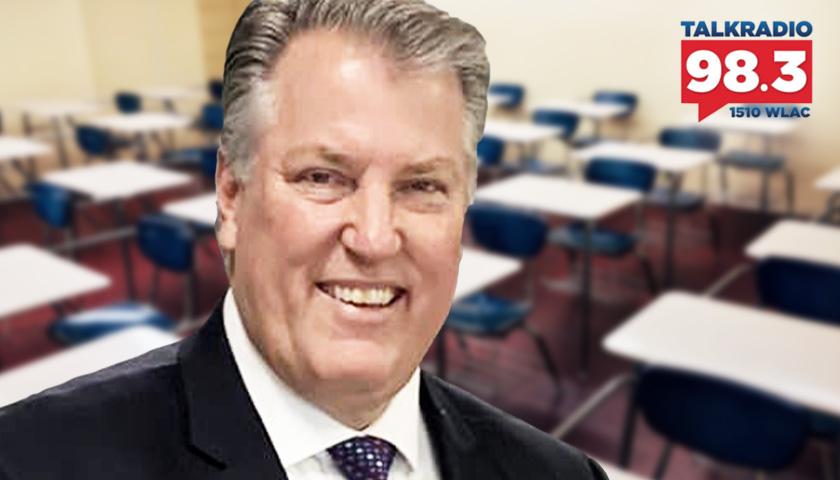Live from Music Row, Tuesday morning on The Tennessee Star Report with Michael Patrick Leahy – broadcast on Nashville’s Talk Radio 98.3 and 1510 WLAC weekdays from 5:00 a.m. to 8:00 a.m. – host Leahy welcomed State Representative Scott Cepicky (R-TN-Culleoka) in studio to discuss working on the education committee in the Tennessee General Assembly and turning around public school education.
Leahy: Right now in studio, State Representative Scott Cepicky is here with us. Scott, busy day for you, right?
Cepicky: Oh yeah. Busy day for me today.
Leahy: You represent Maury County.
Cepicky: I do, yes.
Leahy: When were you elected?
Cepicky: 2018.
Leahy: This is what your third, fourth, or fifth year.
Cepicky: Fifth year, third term.
Leahy: Does it get any easier?
Cepicky: No.
Leahy: It doesn’t?
Cepicky: No.
Leahy: But you’re probably more experienced now in the process, and you were the first term, right?
Cepicky: Yes. I think what happens is longevity and drive brings more responsibility. Especially in being in education. (Chuckles) There are easier places to get involved in the general assembly and education is not one of them. Most members up there do not want to be on education.
Leahy: And why is that?
Cepicky: It’s very difficult.
Leahy: And why is it difficult?
Cepicky: It’s very passionate and you’re affecting children’s lives. And besides healthcare, it’s the biggest budgetary item that we have in our budget.
Leahy: And politically all throughout the state of Tennessee, teachers and administrators are politically powerful as groups and as individuals.
Cepicky: They are. But the focus, and I go back to my childhood when I remember education. I remember going with my mom and dad to those PTA meetings when everybody smoked back then.
And the room would be smoke-filled, literally. But there’d be 300 or 400 parents there. Not yelling at the teachers or the administrators having a dialogue back and forth on how they can be helpful to the student.
Leahy: Back then, the administrators would actually listen to the parents.
Cepicky: And so we’ve gotten to this adversarial relationship between parents and the school system. And so we’ve gotta try to repair that. And one of the ways we repair that in my mind, is going back to the fundamentals and basics of things that used to be the building blocks of education and keep working forward, stacking year after year, on top of each other to where you get a child that can think for themselves, that can do the research for themselves…
Leahy: Can read and write, do arithmetic and art. You start with that?
Cepicky: Right. And articulate a point and defend it. It’s a big challenge we have in education. We have been making a lot of progress over the last three or four years.
We are really starting to turn this battleship around to the point where we’re probably getting to a point where we’re going pull back from English language arts reading, and now we’re going to shift our focus to mathematics.
Leahy: Color me skeptical here for a moment.
Cepicky: Go ahead.
Leahy: When you say we’re turning the battleship around, I see it differently.
Cepicky: Go ahead.
Leahy: I think the battleship is sinking further into the mire. Having said all that, you’ve been really one of the great leaders in the Tennessee General Assembly for education reform.
Cepicky: I’ve been one of the leaders. There’s nobody that passes a bill by themselves. It takes 50 votes in the House and 17 votes in the Senate. It takes a lot of support. You have to argue through a lot of debate with the lobbyists and people that are trying to keep the status quo because there’s $9 billion…
Leahy: A lot of money.
Cepicky: Floating around out there for companies and lobbying firms and people to take advantage of. The problem we’ve gotten to Michael is that in earlier education, you had the money surrounding the teachers and the students. That’s all it was. Money surrounded the teachers and the students providing ample time, good curriculums, and with foundational basics to build on.
Leahy: And now we’re talking about 20 or 30 years ago.
Cepicky: Right. And now today, the money is everything, right? We get into conversations and education committees, and I’ll sit there for 30 minutes, and I won’t hear the word student one time. It’ll be money this, this program, that curriculum, this textbook. And I’m like, what about the kids? Are we doing what’s right for these kids?
Leahy: That’s a key point. Public education ought to be about educating kids in a safe environment. And it’s really about the money. It’s about, who gets the money? And it’s not really about the kids.
Cepicky: No. No.
Leahy: And that’s a big problem.
Cepicky: 40s, 50s, 60s, and 70s before the creation of the Department of Education, we used to lead the nation in education. It was awesome. Public school education was outstanding.
Leahy: Not so much these days, and we’ll come back. You’ve got a couple of bills up. We’ll talk about it.
Listen to today’s show highlights, including this interview:
– – –
Tune in weekdays from 5:00 – 8:00 a.m. to The Tennessee Star Report with Michael Patrick Leahy on Talk Radio 98.3 FM WLAC 1510. Listen online at iHeart Radio.
Photo “Scott Cepicky” by State Representative Scott Cepicky. Background Photo “Classroom” by Wokandapix.






It is adversarial for parents and taxpayers to expect AND demand much improvement in the public education of our children and grandchildren? You want to hear adversarial comments, well here you go – End teacher tenure. Fire the teachers who are not performing in the classroom. Reward the remaining great educators with MERIT raises. Oh, and cut district administrative staffing levels by no less than 30%. These actions would be only a first round of improvement and make an opportunity for even more improvement. Buit, of course, this will never happen.
No , the adversarial relationship does not have to be repaired. There is no longer any agreement as to what the “basic building blocks” even are. Math has been deemed as “racist”. Children have other options than public schools. This epiphany to parents may be the only good thing to come from the scamdemic. Parents are taking , and hopefully will continue to take , their children out of public schools by the hundreds of thousands, until they shut them down as they currently exist.
It is about money. I have reviewed enough budgets and attended enough School Board meetings to know that Public Educations #1 Priority is more money. Establishing more administration or passing more legislation is not going to fix this. Complete and wholesale changes have to be made. Big problems, and this one is about as big as they come, require big solutions. The people responsible for this correction and those with the solutions are being shut out. This starts at the household level.